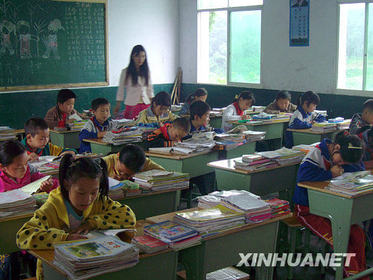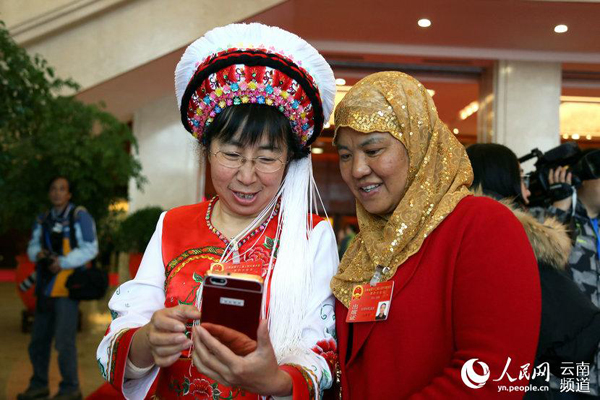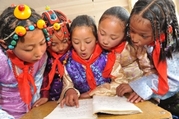Readers of generations in Tibet
Early in the morning, as the first light of daybreak is shed onto the Qinghai-Tibet Plateau, little by little it sprinkles onto the foothills of the Bayan Har Mountains, with this Zhouduo, a 68-year-old Tibetan starts a busy day in Chindu County of Yushu Tibetan autonomous prefecture, Qinghai Provinces.
“Now youngsters can go to kindergarten without any fees, my grandson just turned three and can start studies this March, I applied for him, and personally send him to school and pick him up from school as well.” Said Zhouduo.
Entering the tiny building of the Chindu County Kindergarten, what one sees before their eyes is a variety of different classrooms serving different functions: a thinking room, a science room, a language room and an ethnic culture room...
“A soon as youngsters come here, they like it.” Said Zhouduo.
Watching the children joyfully chasing and frolicking, Zhouduo reflected emotionally on his experience when studying more than half a century ago.
Qinghai province lies on the eastern region of Qinghai-Tibet Plateau. With an average altitude of more than 3,000 meters, grazing land and semi-pastures occupy about 95 percent of the entire land in the province. Being vast and sparsely populated has restricted improvements in basic level education conditions.
“I was 12 when I first started putting a school pack on, and what I remember the most vividly is that I had to walk more than 10 kilometers to school, and I even had to cross a river, sometimes in the summer the water was high enough to cover my knees”. Zhouduo remembered that at the time the classroom was a simple mud-brick building, the roof had leaks, wind came through all the walls, and 20 or more students only had 5 desks to share, so most students had no choice but to sit on the ground and learn from what the teacher had to say. For lunch they could only drink cold water and eat steamed buns.
“Another thing that left a deep memory is that, in that time, notebooks were scarce, and everyday in the morning, the students would pile up on the playground, and each person would draw an area about one square meter, and with rocks they would write new characters from memory and practice mathematics. Thinking of it now, I feel pretty sad.” Said Zhouduo.
Due to his age, after graduating from the elementary, Zhouduo did not continue to study, and instead returned to his village to serve as an accountant. In the 1980s, his family’s financial situation was not at all comfortably off, and they had sent all three children off to attend school.
“When I went to school the facilities had already been upgraded from mud-brick into a more substantial building, yet the conditions were still pretty rough, the classrooms were equipped with kerosene lights, being heated by coal furnaces, after attending a day of class one’s face was covered with soot.” Cicheng, a father said, because 3 jiao (0.05 US dollars) was a lot of money at the time to buy one notebook, after children finished using one side of the notebook, they continued by turning it over and continuing on the back side, it was used until the point where it was really impossible to find a place to write before the children would upgrade to another notebook.
Qinghai has large area of barren land and lots of impoverished residents. “When I went to school, the thing that left the deepest impression was that even when children used the kerosene lamp they could use it very sparingly, and only used the lamps a little bit during the winter months in the mornings when it was truly too dark to do anything, yet as soon as the sun started to pop out it was extinguished right away.” Said Cicheng.
According to information from the Qinghai Province Department of Education,“During the 12th five-year plan, Qinghai province accumulated funds for all categories of education projects amounting to 20.95 billion yuan (3.38 billion US dollars). The amount of newly built or reconstructed square meters of school facilities numbers to 893,160,000. Starting from the spring semester of 2016, Qinghai Province started to implement 15 years of total free education including 3 years of pre-kindergarten learning. It is being expanded into the five autonomous prefectures of Haibei, Hainan, Huangnan, Golog and Yushu as well as in the Haixi Mongol and Tibetan Autonomous Prefecture, furthermore students from impoverished families in Xining as well as Haidong cities also will enjoy the benefits of previously mentioned policy.
15-year free education is a “wonderful and blessed” policy allowing for children from poor families in pasture areas access to fair education, said vice head of the Qinghai Province Education Department Jianhua Xue. In the process of implementing 15 years of free education, Qinghai will continue and takes steps to advance this principle and anticipate to cover the entire province during the 13th five-year plan.
Anzhouma, an instructor from the Chindu County Kindergarten, said “With free tuition for pre-school education starting this semester there have been quite a bit more students coming to study, and there have been many inquiries from parents interested in enrolling their children in September.”
Jiangcai came to the Yushu Tibetan Autonomous Prefecture’s Ba Yi Technical Training School to major in cosmetics and hairdressing after graduating junior high school in 2015.
Jiangcai said, “When I first came I felt a little embarrassed being the only boy, yet I very quickly took a liking to attending school, not only is tuition free we also are provided an environment to receive SPA training, and off campus internships. I hope to work after graduation and a few years later to open my own hair salon, then I will be able to stand on my own feet.”
Your Comment
Name E-mailRelated News
-
;
-
-

-
15-year free education to be implemented in NW China
A 15-year free education program will be implemented in northwest China's Qinghai Province starting from this year's spring term.
-
-
-

-
Dechen and Nujiang will implement 14 years of free education
In Yunnan, Dechen and Nujiang will be the first to implement 14 years of free education all the way from pre-school through high school.
-
-
-

-
Ethnic minority areas of Sichuan province to receive 15 years of f
At a press conference held on Dec. 10, director of Sichuan Provincial Department of Education Zhu Shihong told the reporters that since the spring semester of 2016, 51 counties in the ethnic autonomous regions of Sichuan will implement 15 years freeeducation.
-
Based in Lhasa, Tibet Vista is a Tibet travel agency that specialized in Tibet permit, and Tibet tours for both private and group travelers at a local price!
•4 Days Lhasa City Group Tour from USD 460 •8 Days Everest Base Camp Group Tour from USD 850 •15 Days Mt.Kailash Group Tour from USD 1780 •2016 Tibet Train Tours from Beijing, Shanghai, Chengdu, Xining,etc










